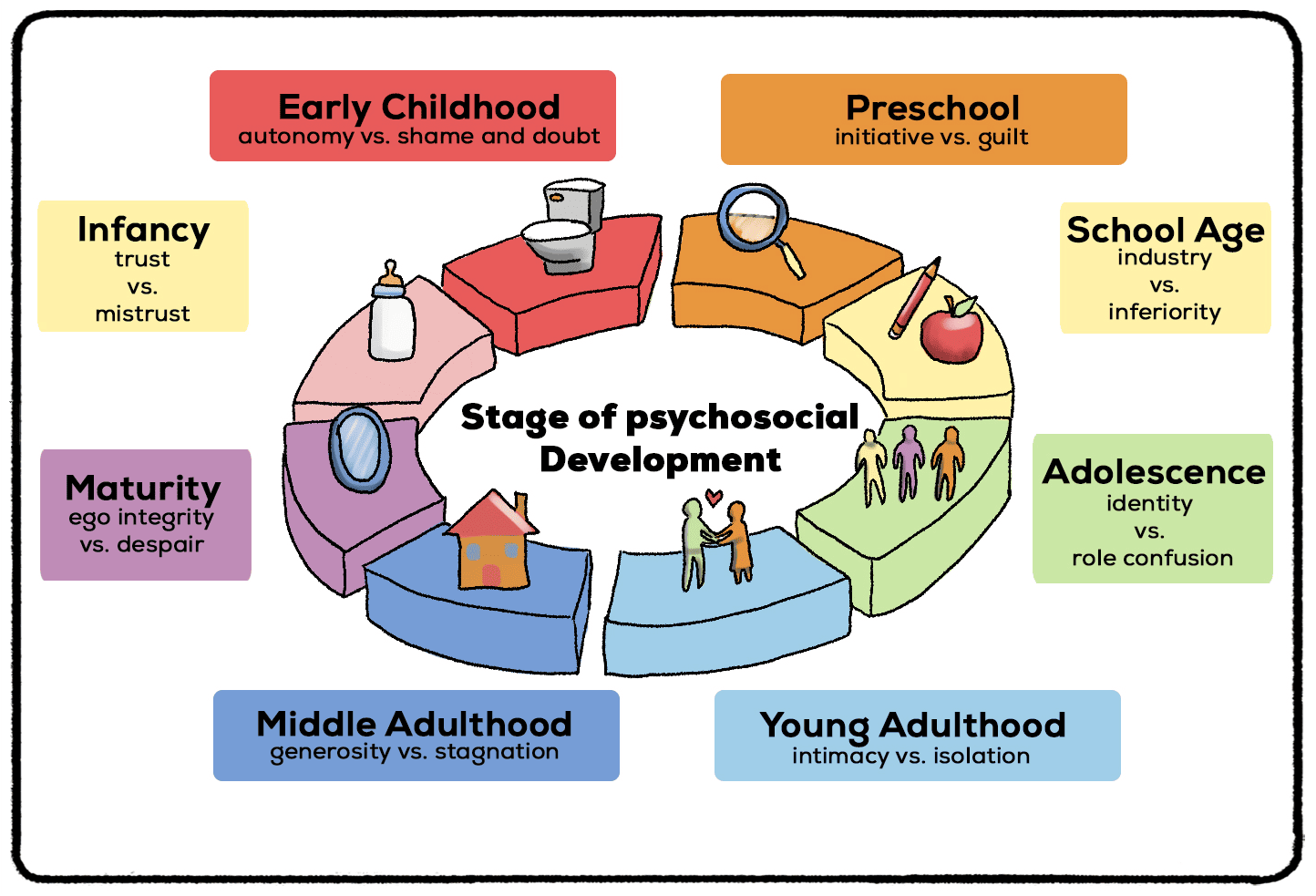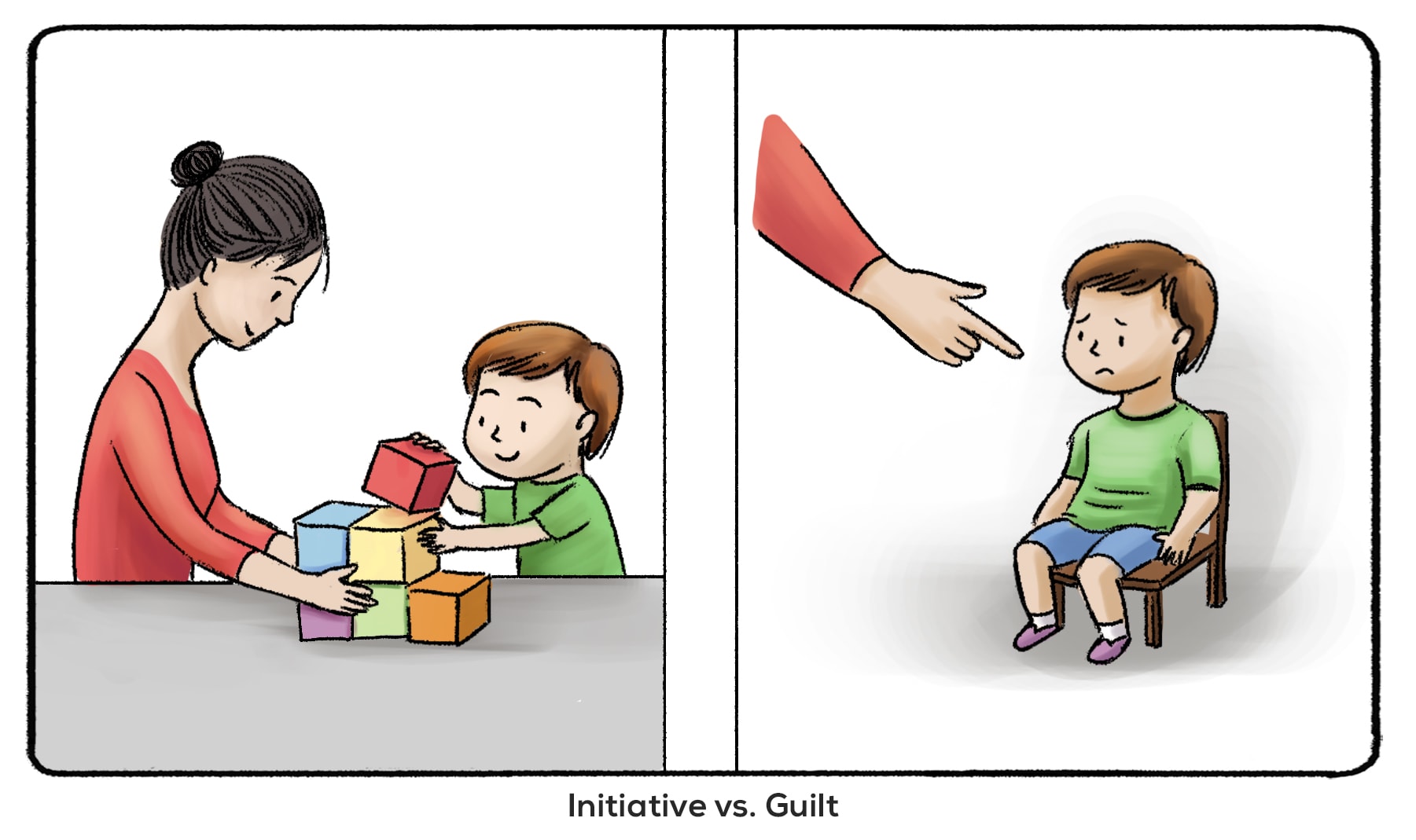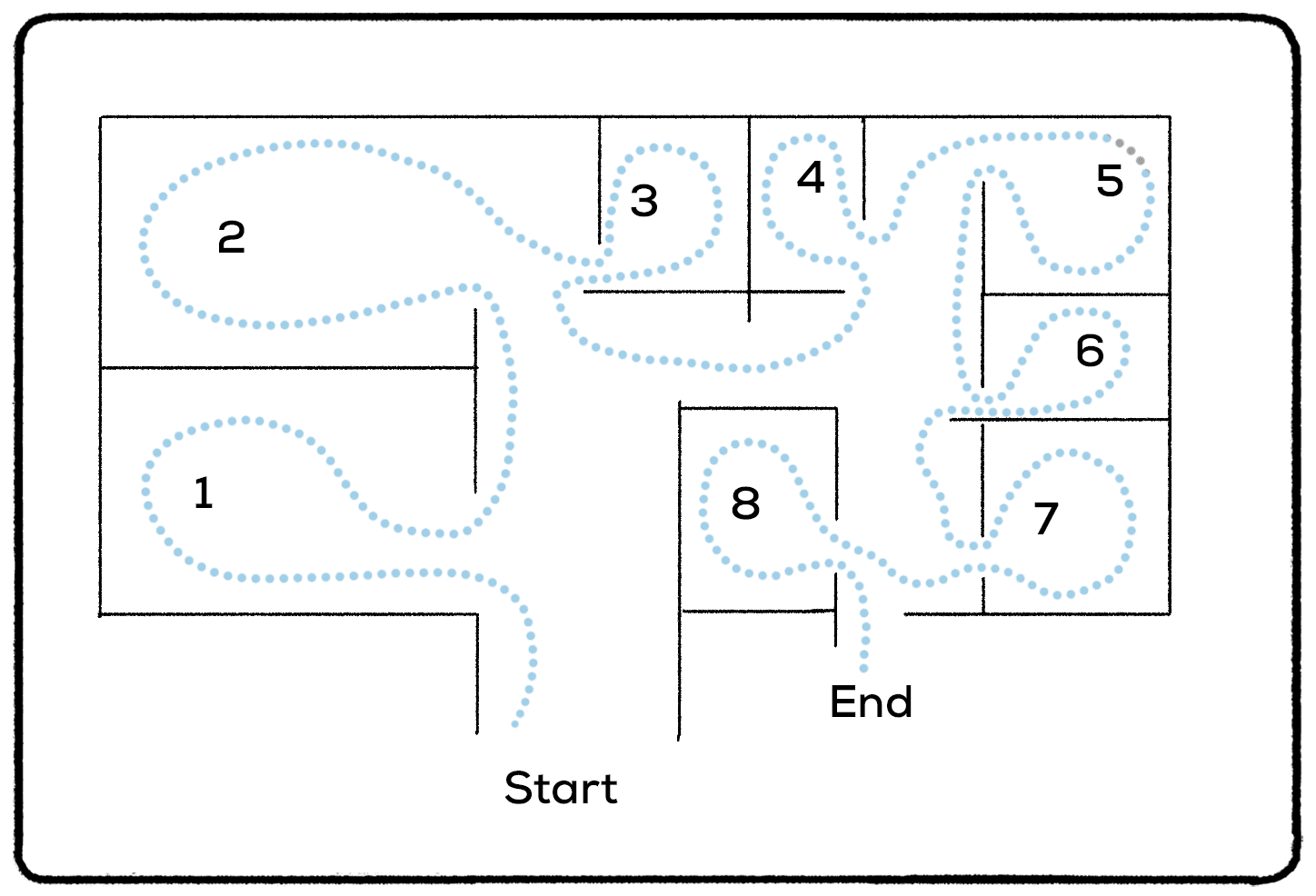Interested in Erikson's Stages of Psychosocial Development? You're in the right place! Read more to learn about each stage of psychosocial development, when it happens, and what a person can gain from this stage. Each stage has its own page with upcoming videos describing the crisis that takes place within each person. Other stages of development, including Piaget's cognitive development, are also featured throughout this site! Bookmark these pages before your next psychology test.
Erik Erikson and his wife, Joan, were German-American psychologists who created a theory surrounding eight phases of psychosocial development. Their work led them to teaching positions at Harvard and a reputation as two of the most prominent psychologists in modern history.
Fun fact: while they drew inspiration from psychologists like Freud and Piaget, Erik did not even obtain a Bachelor’s degree in psychology!
These stages take a person from infancy to their 80s and beyond! While each stage focuses on a different dichotomy and basic virtue, they share one thing. In each stage, the person goes through some sort of “crisis.” They can either rise to the top and develop a healthy personality or feel neglected, shamed, and disappointed in themselves.

What Are The Eight Stages of Development?
- Trust vs. Mistrust
- Autonomy vs. Shame
- Initiative vs. Guilt
- Industry vs. Inferiority
- Identity vs. Confusion
- Intimacy vs. Isolation
- Generativity vs. Stagnation
- Integrity vs. Despair
Trust vs. Mistrust
In the first 18 months of a child’s life, they need food, comfort, and other basic necessities their mother provides. The mother is a key figure in the trust vs. mistrust stage.
If an infant needs something, they will cry. The mother will either respond to the child and fulfill their needs, or the child will be neglected. If the mother continues to fulfill the child’s needs, the child will develop trust and hope. If the child is neglected, they will develop mistrust and insecurities.
This stage isn’t just important for social development. Neglect or lack of socialization in the first months of a child’s life can affect their ability to develop language, communicate, or control their emotions. In a later video, I will discuss studies on neglected children and how their mistrust halts their later development.
Autonomy vs. Shame
As the child develops, they start to learn that they have control over their actions. Between the ages of 18 months and three years, they enter into a second stage of psychosocial development. If parents allow the child to explore their physical body and actions, they will develop a sense of autonomy. If, instead, the parents maintain control over the child, the child may start to develop a sense of shame.
Initiative vs. Guilt
The third stage of development happens between the ages of three and five. The child has the opportunity to take even more control over their world. They can create games for their family, assert themselves more, and even begin to read. If praised for asserting themselves and taking initiative, they will continue to engage in these behaviors. If, instead, they are punished for taking initiative, they will develop a sense of guilt.

Industry vs. Inferiority
During their time at school, a child begins to learn that they are different from the other people around them. They may begin to compare themselves to the people around them. Some children at school receive praise and recognition for their work - these children will gain a sense of self-confidence and industry or hard-working abilities. The children who are not recognized or told to do better will feel inferior. Teachers, neighbors, and a wider circle of acquaintances contribute to this stage.
Identity vs. Role Confusion
Did you know that Erikson coined the term “identity crisis?” In fact, Erikson believed a person faces a “crisis” during each stage. However, “identity crisis” often equates with the identity vs. role confusion stage.
This stage takes place during adolescence. Teenagers aren’t just moody - they are just trying to figure out their identity and role in the world. At this stage, adolescents understand that there are expectations placed upon them. They also know that they have needs and wants of their own. If they are encouraged to pursue their identity, that sense of identity will grow stronger. If there are conflicts, the adolescent will experience role confusion.
Intimacy vs. Isolation
The identity vs. role confusion stage isn’t the easiest to go through! “who am I?” is a big question to answer. But as you start to grasp who you are, you can form stronger relationships with those you want to be with.
The intimacy vs. isolation stage takes place between your 20s and your 40s. At this point, a person has a pretty good grasp on the person they want to be and their true values. They seek other people, including friends and partners, that fit in with their identity. If people find those people and form strong bonds, they can experience intimacy and enjoy love.
Of course, there may be conflicts here. A person may find themselves trying to make friends or form relationships to no avail. The person will feel isolated. In the video about this stage, I will dive deeper into how dangerous isolation actually is.
Generativity vs. Stagnation
By the time you reach your 40s, a person ideally feels more stationary and at a place where they can start to help others with their psychosocial development. By helping others, a person can feel confident that their legacy will outlive them. Future generations will still cherish and share the person’s accomplishments for years after their death.
Without this sense of care or nurturing, people between 40 and 65 can feel stagnant. They might feel that things have stopped and must prove themselves to build a solid legacy. This conflict can result in a person’s “mid-life crisis.”
Integrity vs. Despair
The last stage happens in the last years of a person’s life. At this time, a person can reflect on their accomplishments. Did they achieve what they wanted to achieve? Were they able to create a legacy that can be passed down to future generations? Did they meet the expectations that they (or others) had for them?
If yes, the person develops a sense of integrity and wisdom to share with others. If the answer is no, the person is likely to fall into a state of despair.
These stages come with high highs and low lows. A baby failing to trust its mother or an adult experiencing isolation may also experience strains in their mental health or other forms of development. But when a person is loved, praised, understood, and surrounded by community, they can lead a life with integrity, wisdom, and a legacy to last for generations.
These eight stages are not easy to remember without mnemonic devices! I like to remember long strings of words by creating a phrase with the first letter of each word. With the two "sides" of each stage of development, you could create two phrases:
- TAIGA (Together, Annie Four-Eyes [4 I's] Goes In)
- MSGICISD (Molly's So Great In Charades; It's So Daring!)
Have fun with these two phrases, or even try creating one 16-word phrase using all the terms!

There are many ways to look at child development. Erikson's stages focus on the child understanding themselves and their place in the world. Other theories look at different aspects of development. Jean Piaget, Sigmund Freud, and Lawrence Kohlberg are just three of many child psychologists who have studied development in stages. Piaget, Freud, and Kohlberg's theories are all described throughout this site.
How do they compare to Erikson's stages of psychosocial development? Let's see!
Freud influenced Erikson's work, but they have some significant differences. Freud's stages of psychosexual development focus on childhood. He attributed most of his patients' mental illnesses or personality "flaws" to childhood experiences. The last of the psychosexual development stages end after puberty begins. At this point, Freud believed, the child focuses less on their individual erogenous zones and turns their focus to people of the opposite sex.
While both theories are still studied today, it's important to note that there are many flaws within Freud's theories. He is largely discredited and criticized for failing to back up his theories with anything more than anecdotal evidence and his best guesses. It's hard to trace an "anal-retentive personality" to troubles with toilet training! Erikson's stages, however, are considered relevant today.
Piaget was another influence of Erikson. His stages also end around puberty. However, the work he has done regarding child development is much more relevant than Freud's work.
Piaget's stages of cognitive development contain similar concepts to Erikson's. For example, he discusses how children see themselves in relation to their peers. Role-playing and empathy are widely discussed in Piaget's stages. But he also discusses other cognitive skills that Erikson does not touch on. Piaget describes four stages of cognitive development, in which children develop skills like object permanence and conversion. These skills help children relate to the social and material world around them.
Sometimes, it seems like children are evil. If you ask Piaget, Erikson, or Kohlberg, that's not an unfair judgment! Kohlberg's stages of moral development outline three different stages that last from birth to adolescence. (Although not every teenager or adult develops a mature moral compass!) Each stage is separated into two phases where the child adjusts their view of themselves in the world. This change in perspective changes the child's morality. Piaget describes similar changes. An egocentric child, for example, will have different views on morality than a child who sees themselves as part of society. Empathy changes a child's moral compass, too.
Modern Applications and Critiques of Erikson's Theory
Erikson's psychosocial stages of development have been foundational in psychology and education for decades. Today, they continue to influence various domains but are also met with contemporary critiques and enhancements.
Applications in Contemporary Psychology and Education:
- Educational Settings: Teachers and educators often utilize Erikson's stages to understand the challenges and needs of their students at various age levels. For instance, recognizing the primary conflicts of "industry vs. inferiority" in elementary students can help educators craft classroom experiences that boost self-esteem and competence.
- Therapeutic Settings: Clinicians may use Erikson's framework to identify the root causes of current adult struggles. Understanding if someone might be wrestling with residue from an earlier unresolved conflict, such as "autonomy vs. shame," can direct therapeutic approaches.
- Parenting Workshops: Erikson's stages are commonly introduced in parenting workshops to guide parents in effectively nurturing their child's developmental needs.
Critiques and Contemporary Insights:
- Cultural Relevance: Some critics argue that Erikson's stages, developed based on Western societies, may not universally apply to all cultural contexts. Each culture may have unique milestones and challenges that don't necessarily align with Erikson's framework.
- Fluidity of Stages: There's a growing recognition that development is more fluid than Erikson's somewhat rigid, age-based stages suggest. People might revisit challenges from earlier stages or experience them out of Erikson's sequence.
- Influence of Modern-Day Challenges: Modern challenges, such as digital technology's and social media's pervasive role in identity formation, weren't present during Erikson's time. Some researchers argue for revisiting stages like "Identity vs. Role Confusion" in light of these new societal variables.
- Ethical and Gender Dynamics: Some contemporary psychologists critique Erikson for his binary approach to certain stages, especially those related to generativity and intimacy, which are deeply rooted in traditional gender roles and heteronormative perspectives.
- Nature vs. Nurture: Advances in neurobiology and genetics have deepened the "nature vs. nurture" debate. Some aspects Erikson attributed to psychosocial development might have more of a biological underpinning than previously thought.
Despite these critiques, Erikson's model remains a touchstone in developmental psychology. Its emphasis on the lifelong nature of development and recognizing that growth and challenges don't end in childhood remains a revolutionary and enduring contribution to the field.
There is a reason we still study the stages of development in psychology! These stages are still relevant; many argue they are more relevant as positive psychology has taken center stage. Erikson's stages help us understand why we might feel conflicted when thinking about life fulfillment and our life's general purpose.
Not all of these stages are set in stone. Remember, these are just theories. However, learning what psychologists like Erikson or Piaget have concluded can help us see the human mind in a new light.
